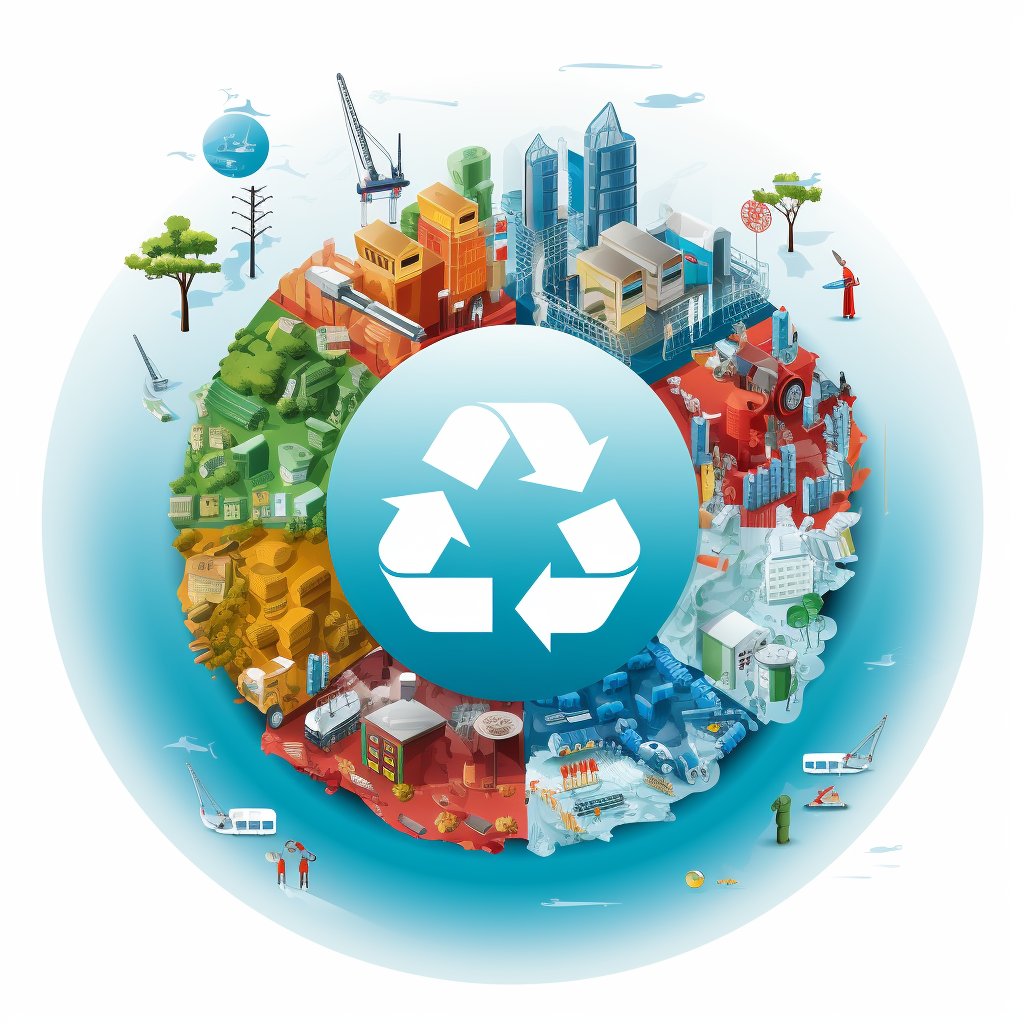The Circular Economy is a new economic growth model that aims to reduce waste and increase the use of renewable resources. A Circular Economy focuses on creating closed-loop systems where resources are reused and regenerated. One of the critical enablers of a Circular Economy is Blockchain can help create transparency, traceability, and trust in the flow of materials and products.
As the world becomes increasingly aware of the need for sustainable and circular economies, the role of the recycling industry has become more critical than ever. With the amount of waste produced worldwide continuing to increase, it is clear that more than current recycling methods are needed to keep up with the demand for recycled materials.
Fortunately, new technologies such as Blockchain for Circularity of Material Flows are emerging that have the potential to revolutionise the recycling industry. Blockchain for Circularity of Material Flows can help create a more sustainable and circular economy by increasing transparency, traceability, and efficiency in the recycling process.

What is Blockchain for Circularity of Material Flows?
Blockchain is a digital ledger technology that enables the creation of tamper-proof, transparent, and auditable records of transactions. In the context of a Circular Economy, Blockchain can help create a transparent and trustworthy record of the flow of materials and products across the value chain. This is important because it enables stakeholders to track the origin, composition, and destination of materials and products. This is critical for ensuring their safe and effective reuse, recycling, or disposal. Different types of Blockchain exist for the Circularity of Material Flows, including public, private, and consortium Blockchains.
Industrial Usage of Blockchain for Circularity of Material Flows
Blockchain for the Circularity of Material Flows is already being used in a range of industrial applications. One example is the use of Blockchain in the plastics recycling industry. In this application, Blockchain is used to create a transparent and auditable record of the flow of plastic waste from collection to recycling. This enables stakeholders to track the plastic waste’s quality, quantity, and origin, which is critical for ensuring its safe and effective recycling.
Application Areas of Blockchain for Circularity of Material Flows
Blockchain for Circularity of Material Flows can be applied in different areas, including supply chain management, waste management, and product lifecycle management. In supply chain management, Blockchain can help create transparency and traceability in the flow of materials and products. It is important for ensuring their safe and effective reuse, recycling, or disposal. In waste management, Blockchain can help create a transparent and auditable record of the flow of waste, which is critical for ensuring its safe and effective recycling or disposal. In product lifecycle management, Blockchain can help create a transparent and auditable record of products’ origin, composition, and destination, which is critical for ensuring their safe and effective reuse, recycling, or disposal.
Consumer Product Examples of Blockchain for Circularity of Material Flows
Blockchain for Circularity of Material Flows can be applied to various consumer products, including electronics, textiles, and packaging. One example is the use of Blockchain in the textile industry. In this application, Blockchain is used to create a transparent and auditable record of the origin and composition of textiles, which is critical for ensuring their safe and effective reuse or recycling.
Material Properties of Blockchain for Circularity of Material Flows
Blockchain for Circularity of Material Flows has a range of material properties that make it suitable for use in a Circular Economy. These properties include transparency, traceability, tamper-proofing, and audibility. This is critical for ensuring their safe and effective reuse, recycling, or disposal.
Future Trends in Recycling Trends
Blockchain for the Circularity of Material Flows is expected to play an increasingly important role in the future of recycling. This is because it enables stakeholders to create transparency, traceability, and trust in the flow of materials and products, which is critical for ensuring their safe and effective reuse, recycling, or disposal. One of the key trends in recycling is the use of Blockchain to create closed-loop systems where materials and products are reused and regenerated. This is important because it reduces waste and creates value from materials that would otherwise be discarded. Another trend is the use of Blockchain to create circular supply chains, where materials and products are sourced from sustainable sources and reused or recycled at the end of their life. This is important because it reduces the environmental impact of production and consumption and creates economic and social value.
Different Blockchain for Circularity of Material Flows
Different Blockchain for Circularity of Material Flows has different market price developments, global impacts, and future market prognoses. Let’s look at some of the most prominent Blockchain for Circularity of Material Flows and their market dynamics.
- IBM Blockchain
IBM Blockchain is one of the most prominent Blockchain for Circularity of Material Flows, offering supply chain transparency and traceability solutions. IBM has partnered with several major corporations in the plastics recycling industry, including Nestle, Walmart, and Unilever. The market price for IBM Blockchain is expected to remain steady and continue growing in the coming years. According to a report by ResearchAndMarkets, the global Blockchain for Supply Chain Market is expected to reach $9.85 billion by 2025, growing at a CAGR of 80.2% during the forecast period.
- Provenance
Provenance is another prominent Blockchain for the Circularity of Material Flows, offering traceability solutions for sustainable products. The platform has already been used in the fashion industry, enabling consumers to trace the origin and sustainability of their clothes. The market price for Provenance is also expected to remain steady and continue growing in the coming years. According to a report by Grand View Research, the global Blockchain for Sustainable Supply Chain Market is expected to reach $1.22 billion by 2028, growing at a CAGR of 44.6% during the forecast period.
- VeChain
VeChain is a Blockchain for the Circularity of Material Flows that offers supply chain traceability solutions for various industries, including food and beverage, automotive, and pharmaceuticals. The platform has already partnered with several major corporations, including BMW, PwC, and DNV GL. The market price for VeChain has experienced some volatility but is expected to continue growing in the coming years. According to a report by Global Market Insights, the global Blockchain Market is expected to reach $30 billion by 2024, growing at a CAGR of over 50% during the forecast period.
Global Impact
Blockchain for Circularity of Material Flows has the potential to create a significant global impact by enabling closed-loop systems and circular supply chains. These systems can reduce waste and create economic and social value while reducing the environmental impact of production and consumption. The adoption of Blockchain for Circularity of Material Flows is also expected to increase transparency and trust in the flow of materials and products, which is critical for ensuring their safe and effective reuse, recycling, or disposal.
Environmental Impact
Blockchain for Circularity of Material Flows has the potential to create significant environmental impacts by enabling closed-loop systems and circular supply chains. By creating transparency and traceability in the flow of materials and products, Blockchain for Circularity of Material Flows can help reduce waste, prevent pollution, and conserve natural resources. For example, Blockchain for Circularity of Material Flows can recycle plastic waste, reducing the amount of plastic waste that ends up in the ocean and other natural ecosystems. Blockchain for Circularity of Material Flows can also help reduce greenhouse gas emissions by enabling the use of renewable energy sources in the production and transportation of materials and products.
Economic Impact
Blockchain for Circularity of Material Flows can also create significant economic impacts by creating value from materials that would otherwise be discarded. Blockchain for Circularity of Material Flows can create economic opportunities for businesses and individuals involved in the recycling industry by enabling closed-loop systems and circular supply chains. For example, Blockchain for Circularity of Material Flows can create new markets for recycled materials, such as plastic and metal. This can create jobs and generate revenue for businesses and local communities. Blockchain for Circularity of Material Flows can also help reduce the costs associated with waste management and disposal, saving businesses and governments money in the long run.
Examples of Blockchain for Circularity of Material Flows around the World
- China
China is one of the world’s largest producers of plastic waste and has been actively adopting Blockchain for Circularity of Material Flows to address this issue. One example is the partnership between Alibaba Group and the city of Guiyang, which has enabled the tracking of plastic waste from collection to recycling using Blockchain technology. This has helped increase the efficiency and transparency of the recycling process while also creating economic opportunities for local businesses.
- Europe
Europe has been at the forefront of adopting Blockchain for Circularity of Material Flows. The European Union has launched several initiatives to promote the adoption of Blockchain for Circularity of Material Flows, including the Circular Plastics Alliance and the Circular Economy Action Plan. These initiatives aim to create a more sustainable and circular economy by promoting the recycling and reuse of materials and products.
- United States
The United States has also adopted Blockchain for Circularity of Material Flows, with several companies and organisations implementing the technology. One example is the partnership between the Ellen MacArthur Foundation and the Walmart Foundation, which has enabled the tracking of plastic waste in the United States using Blockchain technology. This has helped increase the efficiency and transparency of the recycling process, while also creating economic opportunities for local businesses.
Blockchain for the Circularity
Blockchain for Circularity of Material Flows is a key enabler of a Circular Economy. It enables stakeholders to create transparency, traceability, and trust in the flow of materials and products, which is critical for ensuring their safe and effective reuse, recycling, or disposal. Blockchain for Circularity of Material Flows has already been applied in industrial applications, including supply chain management, waste management, and product lifecycle management. It can also be applied to various consumer products, including electronics, textiles, and packaging. In the future, Blockchain for Circularity of Material Flows is expected to play an increasingly important role in the recycling industry, creating closed-loop systems and circular supply chains that reduce waste and create economic and social value.






